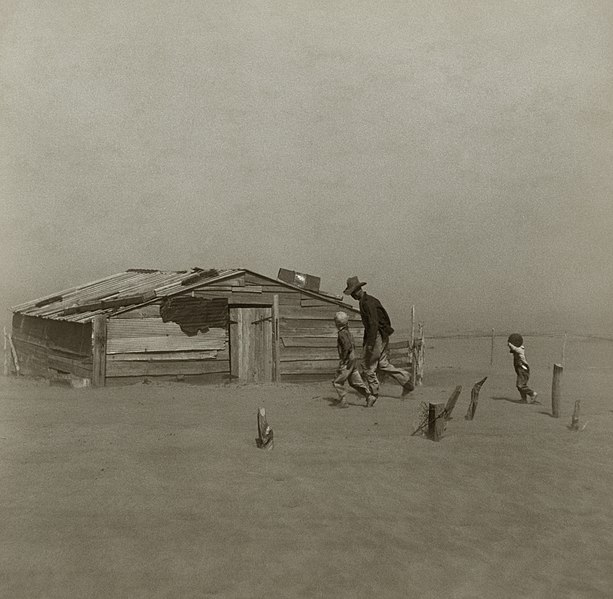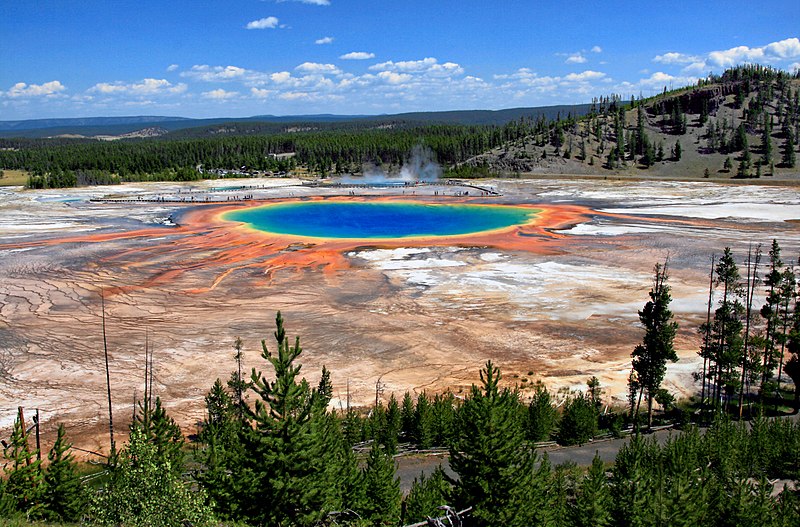.

Young migratory mother, originally from Texas. On the day before the photo was made she and her husband traveled thirty-five miles each way to pick peas. They worked five hours each and together earned $2.25. They have two young children and are now living in an auto camp, Edison, Kern County, California: photo by Dorothea Lange, 1940 (National Archives and Records Administration)
The human gaze has a power of conferring value on things; but it makes them cost more, too.
(1929)
Don't play with what lies deep in another person!
.
The face is the soul of the body.
(circa 1932-1934)
(1929)
Don't play with what lies deep in another person!
.
The face is the soul of the body.
(circa 1932-1934)
Rainclouds gathering over Bareina, desert village in southern Mauretania, West Africa: photo by Ferdinand Reus, 2006
If anyone should think he has solved the problem of life and feel like telling himself that everything is quite easy now, he can see that he is wrong just by recalling that there was a time when this "solution" had not been discovered; but it must have been possible to live then too and the solution which has now been discovered seems fortuitous in relation to how things were then. And it is the same in the study of logic. If there were a "solution" to the problems of logic (philosophy) we should only need to caution ourselves that there was a time when they had not been solved (and even at that time people must have known how to live and think).
(1930)
(1930)
Wolken: photo by BenTheWikiMan, 1980
You can't build clouds. And that's why the future you dream of never comes.
(1942)
You can't build clouds. And that's why the future you dream of never comes.
(1942)

Farmer and his sons walking in the face of a dust storm, Cimarron County, Oklahoma: photo by Arthur Rothstein for the Farm Security Administration, April 1936 (Library of Congress)
I once said, and perhaps rightly: The earlier culture will become a heap of rubble and finally a heap of ashes, but spirits will hover over the ashes.
(1930)
(1930)
Grand Prismatic Spring and Midway Geyser Basin, Yellowstone Park, Wyoming: photo by Mila Zinkova, 2008
Often it is only very slightly more disagreeable to tell the truth than to lie; about as difficult as drinking bitter rather than sweet coffee; and yet I still have a strong inclination to lie.
(1940)
(1940)

Small boat rescues a seaman from the burning U.S.S. West Virginia, with U.S.S. Tennessee inboard, Pearl Harbor, Hawaii, December 1941: photo by US Navy Office of Public Relations, 1941 (Library of Congress)
The horrors of hell can be experienced within a single day; that's plenty of time.
(1937)
If in life we are surrounded by death, so too in the health of our intellect we are surrounded by madness.
(1944)
On U.S. 99, near Brawley, Imperial County, California: homeless family of seven, walking the highway from Phoenix, Arizona, where they picked cotton, bound for San Diego, where the father hopes to get relief because he once lived there: photo by Dorothea Lange, February 1939 (Library of Congress)
You cannot lead people to what is good; you can only lead them to some place or other. The good is outside the space of facts.
(1929)
(1929)

Tipas blowing in the wind, Buenos Aires: photo by blmurch, 2010
Why is the soul moved by idle thoughts? -- After all they are idle. Well, it is moved by them.
(How can the wind move the tree when it's nothing but air? Well, it does move it; and don't forget it.)
(1939-1940)
When I came home I expected a surprise and there was no surprise for me, so, of course, I was surprised.
(circa 1944)
Methar Lam, Afghanistan: Hospital Corpsman 2nd Class Alonzo Gonzales, Kilo Company, 3rd Battalion, 3rd Marine Regiment, walks through an alley in an operation to capture suspected Anti-Coalition Forces, in support of Operation Enduring Freedom: photo by Cpl. James L. Yarboro, U.S. Marines, April 6, 2005 (U.S. Government)
No cry of torment can be greater than the cry of one man.
Or, again, no torment can be greater than what a single human being may suffer.
A man is capable of infinite torment therefore, and so he too can stand in need of infinite help.
(circa 1944)
No cry of torment can be greater than the cry of one man.
Or, again, no torment can be greater than what a single human being may suffer.
A man is capable of infinite torment therefore, and so he too can stand in need of infinite help.
(circa 1944)
House being moved through main street of town, deposited over a rainy Sunday at intersection of U.S. 99, Cottage Grove, Lane County, Oregon: photo by Dorothea Lange, October 1939 (Library of Congress)
An example that shows how monstrously vain wishes are is the wish I have to fill a nice notebook with writing as quickly as possible. I get nothing at all from this; I don't wish it because, say, it will be evidence of my productivity; it is no more than a craving to rid myself of something familiar as soon as I can; although as soon as I have got rid of it I shall have to start a fresh one and the whole business will have to be repeated.
(1939-1940)
Aftermath of Galveston, Texas hurricane of 1900: house on Avenue N: photo by Griffith & Griffith, 15 October 1900 (Library of Congress)
I sit astride life like a bad rider on a horse. I only owe it to the horse's good nature that I am not thrown off at this very moment.
(1939-1940)
(1939-1940)

Sunrise, Tesselated Pavement, Eaglehawk Neck, Tasman Peninsula, Tasmania, Australia: photo by Noodle snacks, 2009
Each morning you have to break through the dead rubble afresh so as to reach the living warm seed.
(1929)
(1929)
Pied Heron (Ardea picata), Great Flight Aviary, Melbourne Zoo, Melbourne, Australia: photo by Noodle snacks, 5 February 2010
My ideal is a certain coolness. A temple providing a setting for the passions without meddling with them.
(1929)
Nothing is so difficult as not deceiving oneself.
.
Longfellow:
In the elder days of art,
Builders wrought with greatest care
Each minute and unseen part,
For the gods are everywhere.
(This could serve me as a motto.)Builders wrought with greatest care
Each minute and unseen part,
For the gods are everywhere.
(1938)
Goldenrod (Solidago graminifolia): photo by Adamantios, 2007
The delight I take in my thoughts is delight in my own strange life. Is this joy of living?
(1931)
The delight I take in my thoughts is delight in my own strange life. Is this joy of living?
(1931)
Light-mantled Sooty Albatross (Phoebetria palpebrata): photo by Vincent Legendre, 2005
Problems of Life: Ludwig Wittgenstein, excerpts from private notes in: Vermischte Bemerkungen (1977), edited by G.H. von Wright; translated by Peter Winch as Culture and Value, 1980













15 comments:
"Before losing consciousness he said...' Tell them I've had a wonderful life!'"
from Ludwig Wittgenstein, "A Memoir" by Norman Malcom, Oxford 1958. P. 180
As gamefaced said, I like this post also. I forwarded “Problems of Life: Wittgenstein” to a friend in Boston who used to teach Wittgenstein to undergraduates and graduate students before turning his large, highly sensitized brain to the practice of tax law. Chris liked it also and replied: “Lovely pictures. Strangely enough I was just looking at “Remarks on Culture and Value” last night. I have been thinking about his observation -- this was in the Tractatus -- that the world of the happy man is different from the world of the sad man. This is meant quite "literally". It's astonishing how much of an influence he continues to exert on me after all these years.” I thought I’d pass this along. I think what you’ve presented here will stay with me for a long, long time.
Tom,
Thanks for this great selection of W. thinking out loud (so it seems) together w/ such moving pictures. What a way to start the day -- a northeast wind starting up, a sunlit cloud moving across the pale blue sky above the ridge, shadowed green leaves beginning to move (like the trees in Buenos Aires. . . .
4.8
pale blue whiteness of sky above shadowed
green ridge, faint white moon above leaf
in foreground, wave sounding in channel
how, at every moment former
experience is present
thing, one given phenomenon,
which means that both
cloudless blue sky reflected in channel,
cormorants flapping across toward point
So much to reflect upon here.
"Before losing consciousness he said...'Tell them I've had a wonderful life!'"
"...the world of the happy man is different from the world of the sad man. This is meant quite 'literally'."
__
how, at every moment former
experience is present
(...this, shall we take it, Stephen, from Heidegger? Can we imagine Wittgenstein and Heidegger in the same room, in conversation? I am put in mind of the philosopher Harry G. Frankfurt's great essay "On Bullshit", with his remarks re. Wittgenstein's ever vigilant alertness to efflorescences of the latter: "Wittgenstein devoted his philosophical energies largely to identifying and combating what he regarded as insidious forms of 'nonsense'. He was apparently like that in his personal life as well".)
__
It is the humility, along with the always disarming honesty, that always stays with me, when I've been reading Wittgenstein's personal notes.
"Endurance of suffering isn't rated highly because there is supposed not to be any suffering -- really it's out of date." (1948)
__
And here is something I have been dwelling upon -- a note from 1950, near the end of his life:
"It is an accident that 'fast' rhymes with 'last'. [In German, 'Rast' = 'rest'; 'Hast' = 'haste'.] But it is a lucky accident, and you can *discover* this lucky accident."
Tom, like a mini-anthology, such depth and resonance ... almost too much to bear.
Many thanks, Don
Tom,
Thanks for all such thoughts -- actually that "how, at every moment former/ experience is present" is from Merleau-Ponty, something from Heidegger today ("question of whether and how, the letting appear of").
Intense, profound, harsh, and yet real.
"...depth and resonance ... almost too much to bear"
"...at every moment former/ experience is present"
"Intense, profound, harsh, and yet real."
Each of these comments helps me to take the measure of Wittgenstein's private remarks on what most matters.
To my mind his notebooks are in some respects akin to Samuel's Johnson's Prayers and Diaries.
These deeply meditative works are records of a dialogue between self and soul, never meant to impress or to convince or indeed to be seen by anybody (and so much the more precious for that).
Each one of them is a delight to read Tom. Read them over and over.
Rightly said.
Wishes are useless. Even the keys of this keyboard are better. Atleast they work the way I want them to.
And equally easy, is deceiving oneself into enlightenment or ignorance.
But the business has to be repeated.
Wonderful post.
Tom - I'm browsing through your backlist, happy as a kid in high grass, and had to tell you that this post has moved me close to tears. The quotations from Wittgenstein themselves, of course, because it's a voice that seems to speak straight from the quiddity of the man. Then the sequence of words and images, which takes me to regions of feeling even words as packed and pregnant as those can only gesture towards. And then because I owe what I know of L.W to my seventeen year old daughter, who leaves home this Autumn for Trinity, Cambridge, because it was Wittgenstein's college, and that's where she needs to be. I think even she might not be familiar with these particular jewels. These unexpected pathways, leaps, and bridges are a great surprising gift for which I am very grateful.
Barry
Lovely to hear from you here, Barry, and fine too to hear you have such a generous source of continuing education (as I believe it is officially termed), in your daughter. As it happens I spent some years at another college situated close enough to Trinity to have allowed me to fling a stone into its great quadrangle, had I so chosen. But there are some things even Americans remain incapable of. My college boasted no one so deep-minded as LW among its scholars, alas. But there was the wonderful doctor who died with Scott at the Pole, Wilson; not to mention Harvey, the fellow who determined that blood does not merely stand still in the veins, but circulates.
Alice at Trinity, you at Caius, me at Queens' - I think we have the joint covered. While we're in East Anglia, I wondered if you could recall which was the post where you have a reference to sitting on the beach at Brightlingsea. I used to take moody teenage bike-rides around those Essex flatlands, so it caught my eye - then someone distracted me and I can't find my way back (blog-wise, at least).
Barry,
I'm embarrassed to have to say I can't think what post that might have been.
The one specific reference to Brightlingsea on the blog that I can recall came toward the latter stages of the comment thread on Aram Saroyan: T C, where I quoted a poem Aram had written as an introduction to a wee mimeo chapbook I did in 1966; I was then living in Brightlingsea, and that's where the deed in question occurred.
But as we're here... I'm sure the world at large will take a keen interest in these few Brightlingsea factoids committed to history by the keeper of the local annals, Edward Percival Dickin, in 1914:
"The name Brightlingsea and its informal conversational form
Bricklesey have many variants. It would be wearisome to print
the 193 forms I have found. Many of them, however, will he found
in the text. When the eccentricities of spelling are eliminated,
there are only three forms left Brightlingsea, Bricklesey, and
Brictriceseia (Domesday). If the Norman scribes did not make a
mistake over Brictriceseia, as they often did over Anglo-Saxon
names, it means Brictric's island. As this form only appears once,
probably it was a mistake.
"The parish consists of a peninsula, two small islands, and parts
of two creeks and the estuary of the river Colne. It was anciently
an island, and was described as such in I295. A map of the
second half of the sixteenth century shows it as an island."
--
I do not alas go quite as far back in the annals as Mr Dickin, but... I do recall the Aldus shipbuilding enterprise was the great firm of the town.
In the 1930s more sprats were landed at Brickle or Brittle Sea than anywhere else in the country.
From what I can tell by recent photographs, seeing the familiar promenade with the familiar shivering bathers and the familiar forlorn rows of Bide-A-Wee cottages, the place has not changed too much.
I was interested to learn that the old Brightlingsea Lido is still going strong (as it were), now with two levels.
Thanks Tom - that must have been it. 'Forlorn' would do very well for that entire coastline from Brictic's almost-island down via Maldon and the Crouch to the heart-stirring Foulness. Excellent moping country. I don't know if you know Denise Levertov's different transatlantic Essex in ' A Map of the Western Part of Essex in the County of England' - this one Epping Forest, the Fenchurch St. line, Lodge's 'A Choice of Valentines', the London rural-mythological borderland:
Pergo Park knew me, and Clavering, and Havering-atte-Bower,
Stanford Rivers lost me in osier beds, Stapleford Abbots
sent me safe home on the dark road after Simeon-quiet evensong ...
May we always be alert for opportunities to use the word 'lido'.
Thanks as ever.
Not Lodge, of course, but Nashe:
It was the merie moneth of Februarie,
When yong men, in their iollie roguerie[2],
Rose earelie in the morne fore[3] breake of daie,
4To seeke them valentines soe trimme and gaie[4];
With whom they maie consorte in summer sheene[5],
And dance the haidegaies[6] on our toune-greene,
As alas at Easter[7], or at Pentecost,
8Perambulate[8] the fields that flourish most;
And goe to som village abbordring[9] neere,
To taste the creame and cakes[10] and such good cheere;
Or[11] see a playe of strange moralitie,
12Shewen by Bachelrie of Maningtree[12].
12] ↑ by Bachelrie of Maningtree, by the bachelours of magnanimity. "Manningtree, in Essex, formerly enjoyed the privilege of fairs, by the tenure of exhibiting a certain number of stage plays yearly. It appears also, from other intimations, that there were great festivities there, and much good eating, at Whitsun ales, and other times."—Nares.
Post a Comment